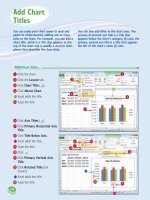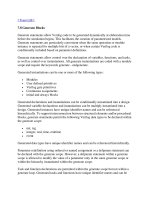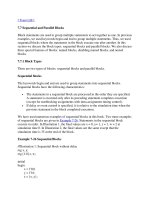Tài liệu Behaviotal Modeling part 6 ppt
Bạn đang xem bản rút gọn của tài liệu. Xem và tải ngay bản đầy đủ của tài liệu tại đây (29.85 KB, 7 trang )
[ Team LiB ]
7.8 Generate Blocks
Generate statements allow Verilog code to be generated dynamically at elaboration time
before the simulation begins. This facilitates the creation of parametrized models.
Generate statements are particularly convenient when the same operation or module
instance is repeated for multiple bits of a vector, or when certain Verilog code is
conditionally included based on parameter definitions.
Generate statements allow control over the declaration of variables, functions, and tasks,
as well as control over instantiations. All generate instantiations are coded with a module
scope and require the keywords generate - endgenerate.
Generated instantiations can be one or more of the following types:
•
Modules
•
User defined primitives
•
Verilog gate primitives
•
Continuous assignments
•
initial and always blocks
Generated declarations and instantiations can be conditionally instantiated into a design.
Generated variable declarations and instantiations can be multiply instantiated into a
design. Generated instances have unique identifier names and can be referenced
hierarchically. To support interconnection between structural elements and/or procedural
blocks, generate statements permit the following Verilog data types to be declared within
the generate scope:
•
net, reg
•
integer, real, time, realtime
•
event
Generated data types have unique identifier names and can be referenced hierarchically.
Parameter redefinition using ordered or named assignment or a defparam statement can
be declared with the generate scope. However, a defparam statement within a generate
scope is allowed to modify the value of a parameter only in the same generate scope or
within the hierarchy instantiated within the generate scope.
Task and function declarations are permitted within the generate scope but not within a
generate loop. Generated tasks and functions have unique identifier names and can be
referenced hierarchically.
Some module declarations and module items are not permitted in a generate statement.
They include:
•
parameters, local parameters
•
input, output, inout declarations
•
specify blocks
Connections to generated module instances are handled in the same way as with normal
module instances.
There are three methods to create generate statements:
•
Generate loop
•
Generate conditional
•
Generate case
The following sections explain these methods in detail:
7.8.1 Generate Loop
A generate loop permits one or more of the following to be instantiated multiple times
using a for loop:
•
Variable declarations
•
Modules
•
User defined primitives, Gate primitives
•
Continuous assignments
•
initial and always blocks
Example 7-31
shows a simple example of how to generate a bit-wise xor of two N-bit
buses. Note that this implementation can be done in a simpler fashion by using vector
nets instead of bits. However, we choose this example to illustrate the use of generate
loop.
Example 7-31 Bit-wise Xor of Two N-bit Buses
// This module generates a bit-wise xor of two N-bit buses
module bitwise_xor (out, i0, i1);
// Parameter Declaration. This can be redefined
parameter N = 32; // 32-bit bus by default
// Port declarations
output [N-1:0] out;
input [N-1:0] i0, i1;
// Declare a temporary loop variable. This variable is used only
// in the evaluation of generate blocks. This variable does not
// exist during the simulation of a Verilog design
genvar j;
//Generate the bit-wise Xor with a single loop
generate for (j=0; j<N; j=j+1) begin: xor_loop
xor g1 (out[j], i0[j], i1[j]);
end //end of the for loop inside the generate block
endgenerate //end of the generate block
// As an alternate style,
// the xor gates could be replaced by always blocks.
// reg [N-1:0] out;
//generate for (j=0; j<N; j=j+1) begin: bit
// always @(i0[j] or i1[j]) out[j] = i0[j] ^ i1[j];
//end
//endgenerate
endmodule
Some interesting observations for Example 7-31
are listed below.
•
Prior to the beginning of the simulation, the simulator elaborates (unrolls) the code
in the generate blocks to create a flat representation without the generate blocks.
The unrolled code is then simulated. Thus, generate blocks are simply a
convenient way of replacing multiple repetitive Verilog statements with a single
statement inside a loop.
•
genvar is a keyword used to declare variables that are used only in the evaluation
of generate block. Genvars do not exist during simulation of the design.
•
The value of a genvar can be defined only by a generate loop.
•
Generate loops can be nested. However, two generate loops using the same genvar
as an index variable cannot be nested.
•
The name xor_loop assigned to the generate loop is used for hierarchical name
referencing of the variables inside the generate loop. Therefore, the relative
hierarchical names of the xor gates will be xor_loop[0].g1, xor_loop[1].g1, .......,
xor_loop[31].g1.
Generate loops are fairly flexible. Various Verilog constructs can be used inside the
generate loops. It is important to imagine, the Verilog description after the generate loop
is unrolled. That gives a clearer picture of the behavior of generate loops. Example 7-32
shows a generated ripple adder with the net declaration inside the generate loop.
Example 7-32 Generated Ripple Adder
// This module generates a gate level ripple adder
module ripple_adder(co, sum, a0, a1, ci);
// Parameter Declaration. This can be redefined
parameter N = 4; // 4-bit bus by default
// Port declarations
output [N-1:0] sum;
output co;
input [N-1:0] a0, a1;
input ci;
//Local wire declaration
wire [N-1:0] carry;
//Assign 0th bit of carry equal to carry input
assign carry[0] = ci;
// Declare a temporary loop variable. This variable is used only
// in the evaluation of generate blocks. This variable does not
// exist during the simulation of a Verilog design because the
// generate loops are unrolled before simulation.
genvar i;
//Generate the bit-wise Xor with a single loop
generate for (i=0; i<N; i=i+1) begin: r_loop
wire t1, t2, t3;
xor g1 (t1, a0[i], a1[i]);
xor g2 (sum[i], t1, carry[i]);
and g3 (t2, a0[i], a1[i]);
and g4 (t3, t1, carry[i]);
or g5 (carry[i+1], t2, t3);
end //end of the for loop inside the generate block
endgenerate //end of the generate block
// For the above generate loop, the following relative hierarchical
// instance names are generated
// xor : r_loop[0].g1, r_loop[1].g1, r_loop[2].g1, r_loop[3].g1
r_loop[0].g2, r_loop[1].g2, r_loop[2].g2, r_loop[3].g2
// and : r_loop[0].g3, r_loop[1].g3, r_loop[2].g3, r_loop[3].g3
r_loop[0].g4, r_loop[1].g4, r_loop[2].g4, r_loop[3].g4
// or : r_loop[0].g5, r_loop[1].g5, r_loop[2].g5, r_loop[3].g5
// Generated instances are connected with the following
// generated nets
// Nets: r_loop[0].t1, r_loop[0].t2, r_loop[0].t3
// r_loop[1].t1, r_loop[1].t2, r_loop[1].t3
// r_loop[2].t1, r_loop[2].t2, r_loop[2].t3
// r_loop[3].t1, r_loop[3].t2, r_loop[3].t3
assign co = carry[N];
endmodule
7.8.2 Generate Conditional
A generate conditional is like an if-else-if generate construct that permits the following
Verilog constructs to be conditionally instantiated into another module based on an
expression that is deterministic at the time the design is elaborated:
•
Modules
•
User defined primitives, Gate primitives
•
Continuous assignments
•
initial and always blocks
Example 7-33
shows the implementation of a parametrized multiplier. If either a0_width
or a1_width parameters are less than 8 bits, a carry-look-ahead (CLA) multiplier is
instantiated. If both a0_width or a1_width parameters are greater than or equal to 8 bits, a
tree multiplier is instantiated.
Example 7-33 Parametrized Multiplier using Generate Conditional
// This module implements a parametrized multiplier
module multiplier (product, a0, a1);
// Parameter Declaration. This can be redefined
parameter a0_width = 8; // 8-bit bus by default
parameter a1_width = 8; // 8-bit bus by default
// Local Parameter declaration.









